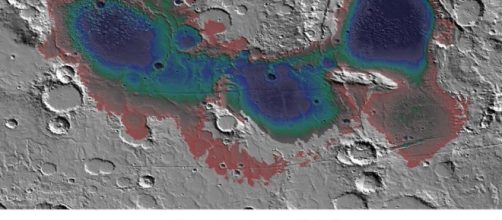The team discovered a volcano that once sat submerged under an ocean of water 3.7 billion years ago on the Red Planet.
Mars does not contain any water or have any remaining active volcanos, but was once a planet teeming with activity, much like our own.
The new find means that nasa can now conduct research into how life developed, what environment the most basic life needs to form, and if it ever existed on our neighbouring planet.
Currently, there is no factual evidence to suggest Mars ever supported life, but the new finding is the closest NASA has come to proving life within our cosmos existed elsewhere.
Similarities to life on our own planet
The reason why the once-underwater-volcano is so important is that it bears similarities to how life on our own planet developed. Some scientists suggest that it was around such active submerged volcanos on earth that the most basic forms of life came into being. The constant flow of warmer waters and chemicals were key ingredients in the evolution of cells. Over time as conditions changed, evolution began to change too.
NASA made a statement saying that the newly found volcano could mean that Mars is the "possible cradle of life."
The volcano discovered on Mars was once active 3.7 billion years ago, as it was beneath the sea, scientists theorise that a similar chain of events could have occurred on Mars around the same time they were happening on earth.
If this was true, then it would mean that two separate types of life form were developing on two different planets in the same solar system - at the same time.
However, as we know, only one of those evolutionary developments survived long enough to become an intelligent form of life.
NASA can use the new groundbreaking discovery to research the origin of life not only on Mars but also on our own planet.
It could lead to further understanding the essential ingredients needed to ensure the evolution of life and how to sustain it.
Mars - the alien planet
Mars has always been an interesting topic of discussion amongst alien truth seekers and ufologists, with many of them suggesting that intelligent life lived or still lives on the Red Planet.
They point to certain formations on the surface of our neighbouring planet that indicate the work of extraterrestrial life, rather than a natural formation.
However, as NASA has a rover patrolling the planet, they claim to have found no such evidence that the planet was once home to an advanced civilisation - or indeed any form of life.
NASA announced that they plan to send a manned mission to Mars a couple of months ago.


